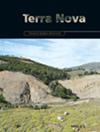Apparent Joint Swarms Formed by the Crack‐Jump Process
IF 1.7
3区 地球科学
Q2 GEOSCIENCES, MULTIDISCIPLINARY
引用次数: 0
Abstract
Joint swarms can be important components of fractured reservoirs. They are often explained as damage around faults or related to mechanical differences between layers, although this does not explain the close spacing of the joints. Joint swarms around Bergen (Norway) are described, which are not related to exposed faults and are not influenced by layering or foliation in the Lower Palaeozoic gneisses. We suggest an evolution whereby: (1) a zone of microcracks develops; (2) one microcrack propagates and becomes connected to a source of mineralising fluid; (3) the fracture becomes a microvein, with a higher tensile strength than the microcracked host rock; (4) another microcrack propagates and the cycle is repeated, producing a zone of microveins; (5) the veins are partly weathered out, producing an apparent joint swarm, or the microveins crack at or near the ground‐surface. Joint swarms in exposed analogues may therefore not occur at reservoir depths.裂缝-跳跃过程形成的明显联合蜂群
节理群可能是断裂储层的重要组成部分。节理群通常被解释为断层周围的破坏或与层间的力学差异有关,但这并不能解释节理间距过近的原因。本文描述了卑尔根(挪威)附近的节理群,这些节理群与裸露的断层无关,也不受下古生界片麻岩的层理或褶皱的影响。我们提出了一种演变过程,即(1)形成微裂缝带;(2)一条微裂缝扩展并与矿化流体源相连;(3)裂缝成为微脉,其抗拉强度高于微裂缝主岩;(4)另一条微裂缝扩展,循环往复,形成微脉带;(5)矿脉部分风化,形成明显的节理群,或者微脉在地表或接近地表处开裂。因此,裸露的类似物中的节理群可能不会出现在储层深处。
本文章由计算机程序翻译,如有差异,请以英文原文为准。
求助全文
约1分钟内获得全文
求助全文
来源期刊

Terra Nova
地学-地球科学综合
CiteScore
4.80
自引率
8.30%
发文量
59
审稿时长
2.3 months
期刊介绍:
Terra Nova publishes short, innovative and provocative papers of interest to a wide readership and covering the broadest spectrum of the Solid Earth and Planetary Sciences. Terra Nova encompasses geology, geophysics and geochemistry, and extends to the fluid envelopes (atmosphere, ocean, environment) whenever coupling with the Solid Earth is involved.
 求助内容:
求助内容: 应助结果提醒方式:
应助结果提醒方式:


